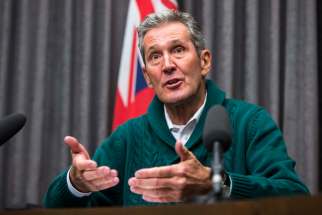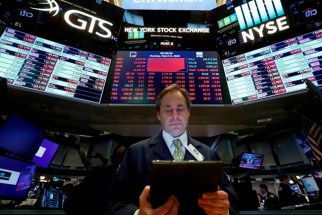Global markets pick up after plunge on virus, oil
Read this article for free:
or
Already have an account? Log in here »
To continue reading, please subscribe:
Monthly Digital Subscription
$0 for the first 4 weeks*
- Enjoy unlimited reading on winnipegfreepress.com
- Read the E-Edition, our digital replica newspaper
- Access News Break, our award-winning app
- Play interactive puzzles
*No charge for 4 weeks then price increases to the regular rate of $19.00 plus GST every four weeks. Offer available to new and qualified returning subscribers only. Cancel any time.
Monthly Digital Subscription
$4.75/week*
- Enjoy unlimited reading on winnipegfreepress.com
- Read the E-Edition, our digital replica newspaper
- Access News Break, our award-winning app
- Play interactive puzzles
*Billed as $19 plus GST every four weeks. Cancel any time.
To continue reading, please subscribe:
Add Free Press access to your Brandon Sun subscription for only an additional
$1 for the first 4 weeks*
*Your next subscription payment will increase by $1.00 and you will be charged $16.99 plus GST for four weeks. After four weeks, your payment will increase to $23.99 plus GST every four weeks.
Read unlimited articles for free today:
or
Already have an account? Log in here »
Hey there, time traveller!
This article was published 09/03/2020 (2106 days ago), so information in it may no longer be current.
BEIJING – Global stock markets rebounded Tuesday from record-setting declines after U.S. President Donald Trump said he would ask Congress for a tax cut and other measures to ease the pain of the spreading coronavirus outbreak.
Oil prices also recovered some of their losses in Monday’s stunning plunge.
European indexes, many of which suffered their biggest one-day drop since the 2008 global crisis on Monday and fell into a bear market, were up by more than 3%. China’s main stock index closed 1.8% higher and Tokyo rose 0.9%.
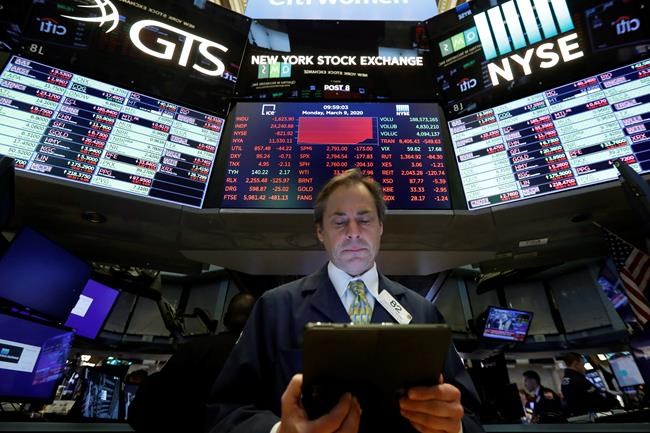
Wall Street is likewise expected to recover somewhat from its largest daily drop in 12 years, with futures for the benchmark S&P 500 and for the Dow Jones Industrial Average both up by 4.2%.
Monday’s global selloff reflected alarm over economic damage from the coronavirus that emerged in China in December. Anti-disease controls that shut down Chinese factories are spreading as the United States and European countries close schools, cancel public events and impose travel controls.
Anxiety mounted after Italy, the hardest-hit place in Europe, said travel controls imposed earlier on its north would be extended nationwide. Ireland cancelled St. Patrick’s Day parades and Israel ordered visitors quarantined ahead of Passover and Easter, one of the busiest travel periods of the year.
The mounting losses and a flight by investors into the safe haven of bonds have fueled warnings the global economy, which already was showing signs of cooling, might be headed into a recession.
The drop in U.S. stock prices was so sharp that it triggered Wall Street’s first trading halt in more than two decades. But Trump’s comment that he will seek relief for workers as ripple effects of the outbreak spread gave some investors an excuse to resume buying.
“This is not like the financial crisis where we don’t know the end is in sight,” said Treasury Secretary Steven Mnuchin. “This is about providing proper tools and liquidity to get through the next few months.”
In European trading hours, London’s FTSE 100 was up 3.8% to 6,193 and Frankfurt’s DAX advanced 3.2% to 10,965. The CAC 40 in France gained 3.8% to 4,885.
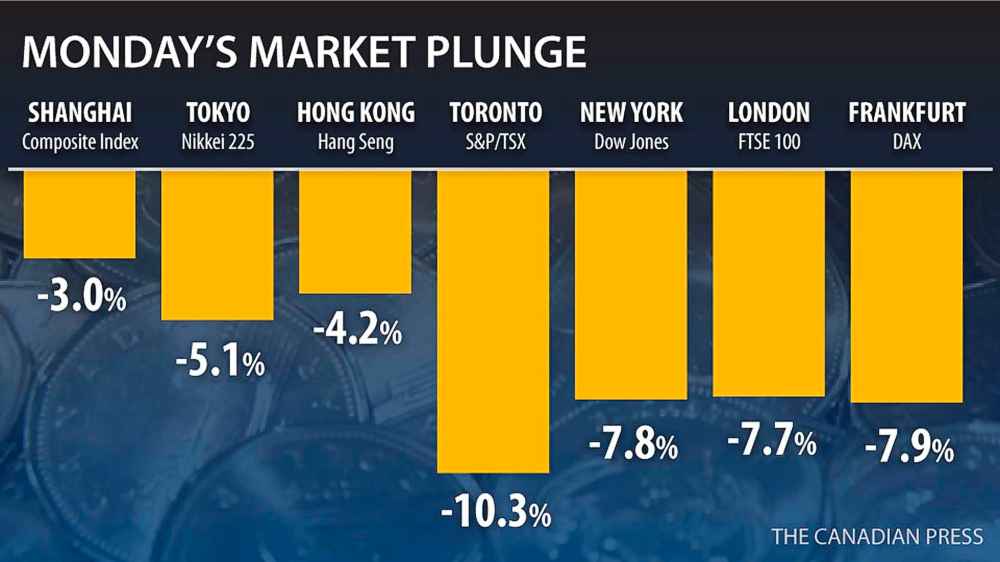
The Shanghai Composite Index rose 1.8% to 2,996.76 and the Nikkei 225 in Tokyo advanced 0.9% to 19,867.12. Hong Kong’s Hang Seng climbed 1.4% to 25,392.51.
The Kospi in Seoul added 0.4% to 1,962.93 and Sydney’s S&P-ASX 200 rose to 5,939.60.
Benchmark U.S. crude jumped 8.5%, or $2.65 to $33.78 per barrel in electronic trading on the New York Mercantile Exchange. It lost 25% on Monday after Saudi Arabia and Russia engaged in a price war in the oil market. The Saudis confirmed Tuesday that they will increase production to record levels.
Brent crude, the standard for international oil prices, gained 8.3%, or $2.85 to $37.21 per barrel in London.
Stock markets usually welcome lower energy costs for consumers and businesses. But the decline cuts into revenue for producers, including the United States. And the abrupt drop, coming amid virus fears, rattled investors.
While the virus outbreak is easing in China, where the virus was first detected, fast-growing clusters have turned up in South Korea, Japan, Iran and Italy, and the caseload is growing in the United States.
For most people, the coronavirus causes only mild or moderate symptoms, such as fever and cough. For some, especially older adults and people with existing health problems, it can cause more severe illness, including pneumonia. The vast majority of people recover from the virus, as has already happened with about three-quarters of those infected in China.
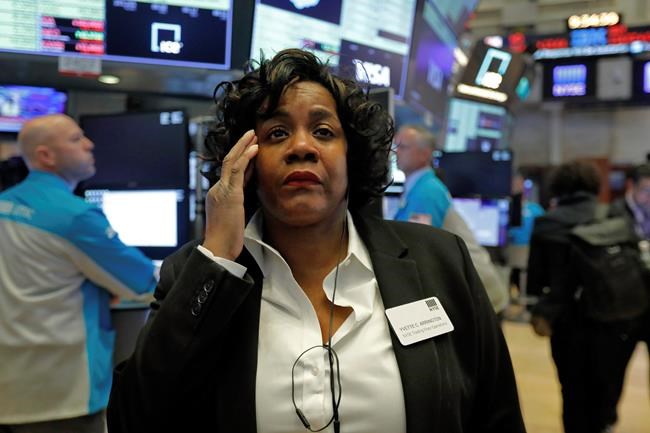
On Wall Street, the S&P 500 index fell 7.6% in biggest one-day drop since Dec. 1, 2008. The Dow lost 7.8% and the Nasdaq composite gave up 7.3%.
The S&P dropped 7.4% in the first few minutes of trading, triggering an automatic 15-minute market-wide trading halt. That has happened only once before, in 1997.
The S&P 500 has fallen 18.9% from its Feb. 19 record and has lost $5.3 trillion in value. U.S. stocks are close to entering a bear market, defined as a drop of 20% from their peak.
Central banks in the United States, China and other countries have cut interest rates to try to shore up economic activity. But economists warn that while rate cuts might help to buoy consumer demand, they cannot reopen factories that are closed due to quarantines or lack of workers and raw materials.
“Even co-ordinated policy responses are not a tried and tested panacea and by no means guarantee the ability to durably pull markets back from the brink of bear territory,” Vishnu Varathan of Mizuho Bank said in a report.
The yield on 10-year U.S. Treasury bonds edged up to 0.69% after falling as low as 0.5% as investors shifted money into safe haven assets. It had never been below 1% until last week.
The yield, or the difference between the market price and what investors will receive if they hold the bond to maturity, is seen as a measure of economic confidence. Investors shift money into bonds if they expect economic growth and stock prices to weaken. That pushes up the bond’s market price and narrows the yield.
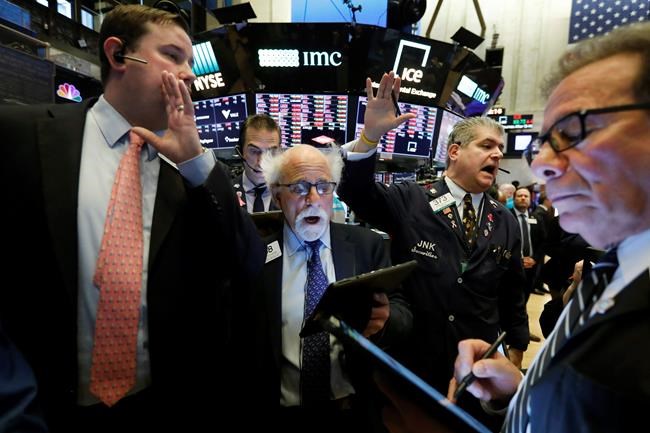
In currency trading, the dollar rose to 104.69 Japanese yen from 102.37 late Monday. The euro slipped to $1.1361 from $1.1439.
___
The Associated Press receives support for health and science coverage from the Howard Hughes Medical Institute’s Department of Science Education. The AP is solely responsible for all content.
History
Updated on Tuesday, March 10, 2020 2:41 PM CDT: Removes extra images




